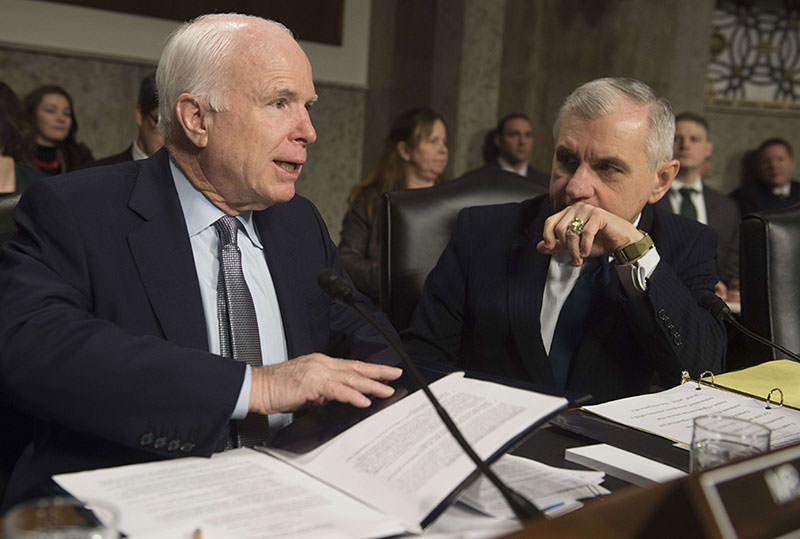
U.S. Republican Senator John McCain slams President Obama over the failure to move decisively to save Ukraine from the danger of disintegration triggered by Russian aggression
As Ukraine has long been facing a Russian expansionist threat in the east of the country, United States Republican Senator John McCain harshly criticized President Barack Obama's policy, which he sees as a failure to stop the ongoing standoff between Russia and Ukraine. McCain, an outspoken critic of the Obama administration's national security policies, warned of the potential danger of the dissolution awaiting the Ukrainian government. "I am ashamed of my country, I am ashamed of my president and I am ashamed of myself that I have not done more to help these people," McCain said on CBS's "Face the Nation" on Sunday. "It is really, really heartbreaking."
"I believe that German Chancellor [Angela Merkel] and President of France [Françoise Hollande] legitimized, for the first time in 70 years, the dismemberment of a country in Europe. It's shameful. [Russian President] Vladimir Putin has not paid any price," McCain said.
Republicans have long criticized the limits that Obama has set on assistance to allies like Ukraine. Other than Ukraine, U.S. arms deliveries to Jordan were also discussed in the Senate. McCain urged Washington to step up the fight against potential threats to U.S. national security. Some senators from both parties have long criticized the Obama administration for boosting defensive lethal military assistance to Ukraine to defend itself against rebels backed by Russia. Arming Ukraine by providing lethal weaponry and additional Western sanctions on Russia still remains on the table as there is less confidence that the newest truce will last long as pro-Russian separatists have been continuing their assault on strategic areas. In response to Russia's heavy military presence in Ukraine, Ukraine asked the U.S. and Canada to provide lethal weapons and military assistance in order to fight Russian troops in eastern Ukraine.
Ukraine has always been under Russia's thumb and is suffering even more from the months-long crisis triggered by Russia. The annexation of Crimea and its support for the violent separatist uprising in eastern Ukraine lends credence to the argument that Russia is attempting to flex its dominance in the rebel-held region. The Russian position is still too far removed to reconcile and Russia's conflicting interests in the Ukrainian crisis is preventing a sustainable settlement between Kiev and separatists in eastern Ukrain.
Meanwhile, the shaky truce has apparently deteriorated further and breaches of the Minsk Accords have been widely reported demonstrating that the months-long crisis in Ukraine's east still has a long way until it is resolved despite a series of mediating talks and peace efforts. Ukrainian forces have not yet started withdrawing heavy weapons from the front line in the east as pro-Russian separatists have continued attacking government positions. The cease-fire agreement negotiated in the four-power talks on February 12 includes the withdrawal of all foreign weapons and troops from Ukrainian territory and the disarmament of Russia-backed rebel groups. "As Ukrainian positions are still being fired upon there can be no talk yet of a withdrawal of arms," military spokesman Vladyslav Seleznyov wrote in a statement on Facebook on Monday, as reported by Agence France-Presse.
Following the pro-Russian rebels' seizure of the strategic town of Debaltseve, separatist have advanced deeper into Ukrainian territory and raised concerns for the fate of the internationally brokered cease-fire. The foreign ministers of France, Germany, Russia and Ukraine met on Tuesday in Paris as part of a mediating effort.
The months-long conflict in eastern Ukraine has come at the cost of an increasingly-high death toll with a large increase in the numbers of internally displace people. A major humanitarian crisis has hit the country hard since the trouble erupted in February 2014 as around 2 million people have been internally displaced due to worsening humanitarian conditions.
